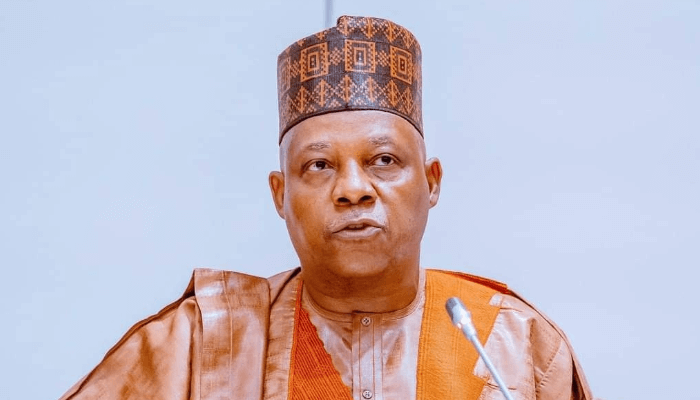…Ummahani, Sanusi, Katuka call for maximising of non-interest finance potentials
Vice President Kashim Shettima and other economic stakeholders have called on African nations to deepen the adoption of Islamic finance as a tool for inclusive and sustainable economic transformation across the continent.
Represented by Tope Fasua, Special Adviser to the President on Economic Matters, Shettima made the call while addressing delegates at the 7th African International Conference on Islamic Finance (AICIF) held in Lagos on Tuesday. The Conference was organised by the Metropolitan Law and Metropolitan Skills Limited in collaboration with the Securities and Exchange Commission of Nigeria (SEC).
Speaking on the theme “Africa Emerging: A Prosperous and Inclusive Outlook,” the Vice President said Africa’s demographic advantage must translate into equitable prosperity, stressing that the continent’s progress will be measured not only by growth but by inclusion. He highlighted Nigeria’s recent economic reforms under President Bola Tinubu’s Renewed Hope Agenda as key drivers of stability and investor confidence.
Earlier, Ummahani Ahmad Amin, conference Chairperson said that AICIF was conceived as a platform for collaboration and knowledge sharing to advance Islamic finance as a viable alternative source of funding for Africa’s socio-economic needs.
She noted that while Islamic finance assets globally reached $3.88 trillion in 2024, Africa still lags behind in harnessing its full potential to close the continent’s annual infrastructure financing gap of up to $170 billion.
In his opening remarks, Mairiga Katuka, chairman, SEC said Nigeria’s non-interest capital market had grown rapidly under the Capital Market Masterplan (2015–2025), with sovereign sukuk raising over N1.4 trillion and funding 124 critical road projects nationwide.
In his remarks, Sanusi Lamido Sanusi, Emir of Kano and former Governor of the Central Bank of Nigeria (CBN) urged Islamic finance institutions across Africa to focus more on supporting small and medium enterprises (SMEs) in underserved communities as a pathway to achieving shared prosperity and sustainable development.
Sanusi emphasised that Islamic finance can only make a meaningful impact when it directly addresses the financial exclusion faced by small businesses and vulnerable groups.
Read also: China warns against use of force as U.S. threatens military action in Nigeria
The conference, co-hosted by the Securities and Exchange Commission (SEC), brought together regulators, scholars, development partners, and investors from across the African continent.
According to Shettima, Nigeria has unified its exchange rate, rationalised subsidies, modernised tax and customs systems, and opened new gateways for trade and investment reforms, which have lifted reserves above $40 billion and earned favourable ratings from Fitch and Moody’s.
“These outcomes reaffirm Nigeria’s position as an anchor of the AfCFTA’s $3.4 trillion market and a driver of Africa’s growth,” he said.
The Vice President emphasised that Islamic finance provides a credible framework for promoting shared prosperity, rooted in ethics, fairness, and social responsibility.
He said Nigeria’s experience demonstrates the transformative potential of Islamic finance instruments such as sukuk, takaful, murabaha, and waqf, which have financed critical infrastructure and expanded access to inclusive financial services.
“Our sukuk issuances, now in their seventh cycle, have funded more than 120 major road projects covering nearly 6,000 kilometres,” Shettima noted. “Each bond represents a covenant between government and citizens, proof that finance can build rather than burden.”
Shettima added that takaful insurance is extending protection to millions of previously excluded households, while waqf endowments are being explored to support schools, hospitals, and small businesses.
“Islamic finance aligns with our conviction that enterprise must serve humanity and wealth must circulate to uplift communities,” he said.
Across Africa, Shettima observed, countries like Egypt, Senegal, Kenya, and South Africa are developing regulatory frameworks for Islamic banking, green sukuk, and socially responsible investments.
By 2030, the share of Islamic finance in Africa’s capital markets is projected to expand significantly, he said, urging policymakers to sustain reforms that strengthen transparency, governance, and investor protection.
He also underscored the need to mobilise Africa’s vast domestic capital, including pension funds, sovereign wealth funds, and insurance pools, through innovative instruments such as green sukuk and diaspora bonds.
“Africa’s future must be financed from within, guided by principles of justice, inclusion, and sustainability,” Shettima asserted.
Shettima concluded by urging participants to “build an Africa where enterprise and empathy coexist, where finance is not a privilege for the few but a promise to the many, and where every child, from Lagos to Lusaka, finds a stake in the continent’s future.”
Meanwhile, Ummahani emphasised that challenges such as limited liquidity, weak market infrastructure, and inadequate investor education must be addressed for Islamic finance to reach its potential.
“Artificial intelligence is also reshaping finance across the continent, from automating compliance to personalising ethical investment, and we must ensure ethical guardrails guide its use,” she said.
Katuka noted that Nigeria now has 19 registered halal mutual funds managing over N112 billion in assets, up from one fund in 2008, and pledged the SEC’s commitment to evolving regulatory frameworks for innovations such as innovative sukuk, tokenisation, and blockchain-enabled
The two-day conference also features a startup pitch competition supporting innovations in technology and social impact, as well as an awards ceremony honouring individuals and institutions contributing to the growth of Islamic finance across Africa.
“I would be happier to see Islamic banks that are big, but more importantly, ambitious enough to grow a market that delivers real value to people and helps reduce poverty,” Sanusi stated. “We need to begin now to see how we can use finance to create opportunities for the small people.”
The Emir underscored the need for Islamic financial institutions to go beyond conventional models by extending services to the grassroots, where the majority of Africa’s unbanked population resides. He called for bold strategies that bridge cultural and social barriers that have historically hindered access to finance, particularly for women.
“Go to the grassroots, have the courage to build and connect with the cultural conceptions and attitudes that have denied women. The empowerment of women is what will contribute to prosperity in Africa,” he added.

